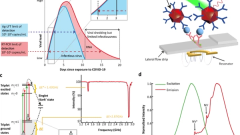ABSTRACT
Bioluminescence holds notable promise as a modality in diagnostics due to its high signal-to-noise ratio and absence of incident radiation. However, challenges arise from rapid signal decay and reduced enzyme activity when linked to targeting molecules, limiting its reliability in point-of-care diagnostic applications. Here we introduce the luminescence cascade-based sensor (LUCAS) assay, an enzyme cascade system capable of detecting analytes with ultrahigh sensitivity and prolonged bioluminescence. Utilizing a sequential enzymatic reaction, our assay achieves a greater than 500-fold increase in bioluminescence signal and maintains an 8-fold improvement in signal persistence compared to conventional bioluminescence assays. Implemented on a portable, fully automated device designed for point-of-care settings, our system facilitates rapid (<23 min) sample-to-answer analysis of viruses without an external power supply. Its accuracy surpasses 94% in the qualitative classification of 177 viral-infected patient samples and 130 viral-spiked serum samples, various pathogens including the respiratory virus SARS-CoV-2, and blood-borne pathogens such as HIV, HBV and HCV as clinical models. The decentralized, rapid, sensitive, specific and cost-effective nature of LUCAS positions it as a viable diagnostic tool for low-resource environments.
